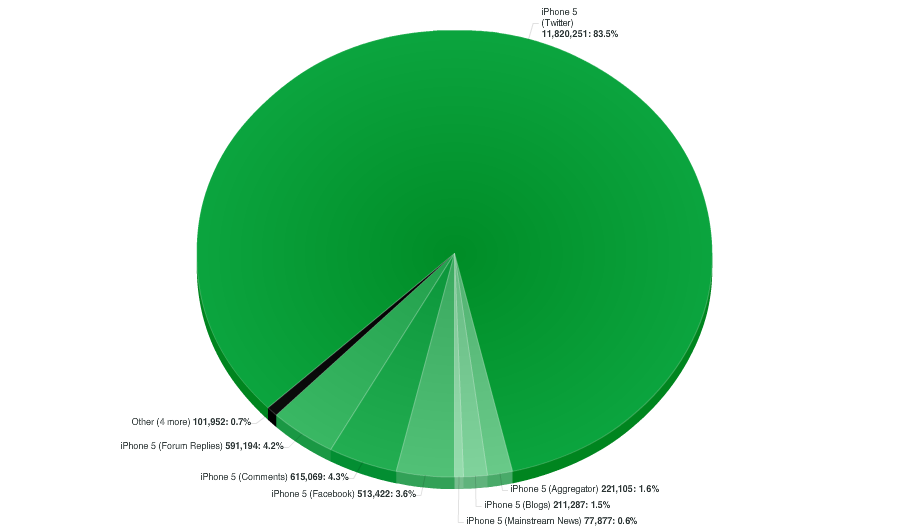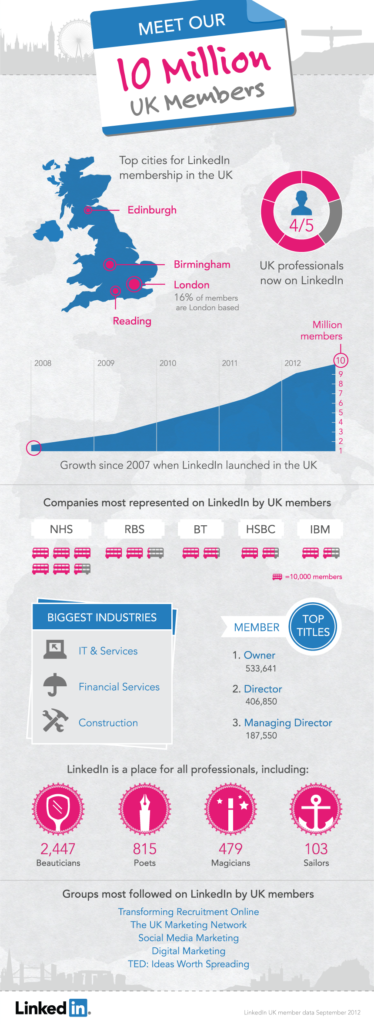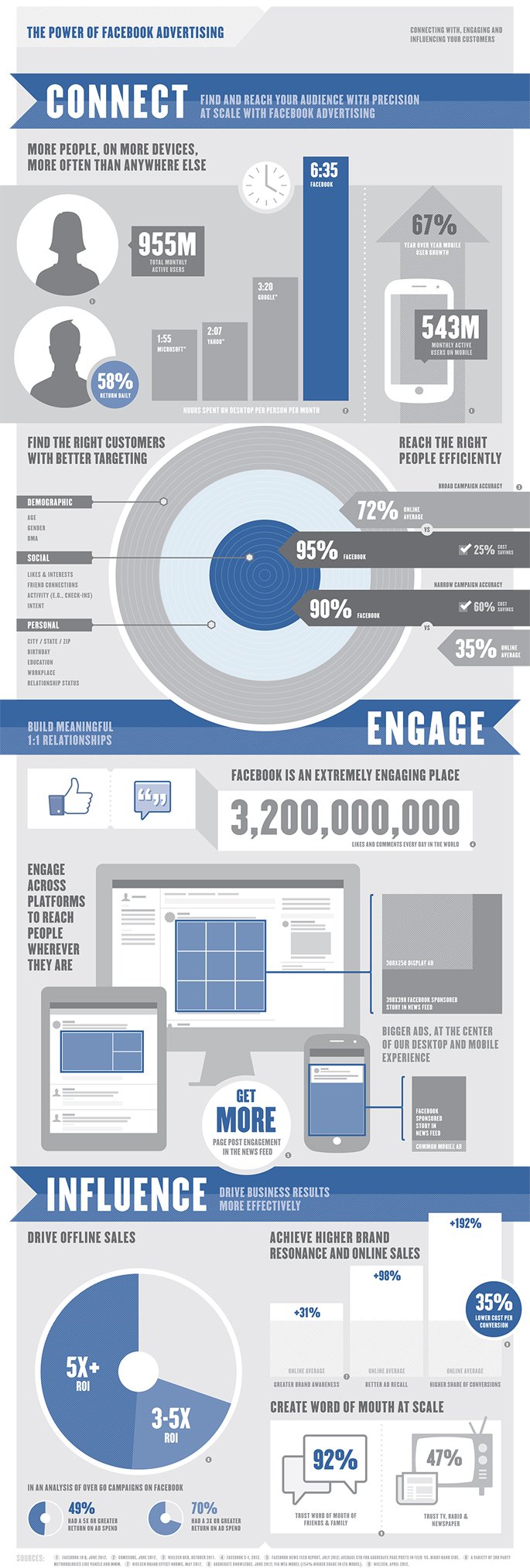Apple are notoriously reluctant to use social media and do not advertise their Facebook Page on their website which is extremely rare for a technology company.
We decided to run a quick volume analysis using Radian6 to determine where the online conversation relating to the iPhone 5 is taking place only to discover that Twitter is the primary location for aggrieved Apple commentators to vent their anger. The graph below taken from Radian6 reveals that a staggering 11m mentions in the last 30 days are taking place on the social network.
Mainstream online news coverage sits at a paltry 77,800 mentions in comparison.
Social media is clearly a driving force in influencing consumer reactions to Apple’s new product launches. The question remains open as to whether the company intends to take part in this huge volume of conversation or remain outside watching in.
Following Google’s Search plus Your World update, natural search and social media have continued to integrate. Facebook and Twitter both appear in search listings and run internal search engines that pull up results from their networks and receive more searches than ever before – the question for marketing professionals is: how will your strategy be impacted and what should be done to accommodate social search into your online marketing strategy?
If you are interested in attending, we’d be delighted to have you join us. Please email Hannah with your details to RSVP: hannah.melbourn@tugsearch.co.uk
http://techland.time.com/2012/09/18/50-best-websites-2012/#introduction-2
I was quick to go through the list and find anything interesting, and sure enough, some of these sites will become our latest object of addiction soon. Even though the list reflects an essentially North-American perspective, one particular website did catch my attention: Persuasive Games.
The founder of the website, Ian Bogost, Ph.D, is a professor at Georgia Tech, and games theorist. He has written several books on the power of video games as an expressive and persuasive medium, in recent years. In his 2007 publication, Persuasive Games, he argued that video games, due to their interactivity and simulation of various situations, have an enormous potential to educate players on a wide range of issues. The web-based games he helped to create for the website, therefore, are an embodiment of the ideas from his book. Some games have been designed for advertisers, others for educational bodies, or even public policy makers.
One game, entitled Killer Flu, replicates the layout of popular strategy games such as Age of Empires and Sims, but aims to educate about how pandemic flu spread and mutate, while another game, Airport Insecurity, forces the player to raise questions about how enforced protection post-9/11 can still undermine security systems in airports. Evidently, these ‘persuasive games’ deal specifically with current topical issues, but it will be interesting to see how web-based video games can gradually develop a power to change public perceptions on wider social issues.
This means that 4 out of 5 British professionals are now LinkedIn members. The UK is currently LinkedIn’s third largest member market globally – exceeded only by the United States and India.
The importance of the professional network in consideration for any B2B online marketing campaign cannot be overstated as members and engagement continues to grow.

Facebook is on the hunt for its first UK managing director to help navigate its next phase of development and calm the nerves of flighty city investors.
A UK headhunter has been approaching senior executives at traditional and digital media owners with the new managing director role, responsible for the day to day running of Facebook UK.
The incoming candidate will be responsible for around 150 staff, and will report into Joanna Shields, vice president of EMEA at Facebook.
So, is that a job for you?
Quite how Facebook intends to capitalise on this search volume and what exactly can be done to introduce a “social search” remains unclear. Facebook is however uniquely positioned to take advantage of personalised search results and has the added dimension of recommendations that can determine what your friends think about a specific event, venue or product – did they like it and therefore will you?
It is the human factor that Facebook aim to add to the search results, making them “social” and ultimately more valuable than results delivered by a cold algorithm.
Chuckling somewhat, Zuckerberg added: “At some point, we’ll do it“.
So what is in the pipeline for the world’s first social network? “The biggest question on everyone’s mind is really going to be how well Facebook does with mobile”, Zuckerberg announced at a conference. He claims that there are more mobile users than online users, and that mobile users spend more time on average connected to the network than online users, therefore reading more posts and other content. One of his new ideas consists in integrating sponsored ads more into the Facebook mobile app. Indeed, Zuckerberg states yet another reason for expanding into mobile, which is not to be underestimated: “per person on mobile, we think we’re going to make more money on them than on desktop”.
If the supreme lord of social networking says it, then it must be true! In a world where we are all increasingly prone to going online on our mobile devices – when we are on our way to work, when we are killing time while waiting for someone, or when we are just relaxing at home on the sofa -, a strategy for mobile has become an indispensable part of the overall marketing strategy for any brand or business. If you are preparing your own strategy, remember that your target audience will always have some spare few minutes to visit your site on their mobile device; think carefully about how this could benefit to your business.

Are you trying to reach out to hundreds of millions of people to communicate your message or promote your brand as quickly as possible? Well, here is how it is done.
PSY, a 34-year-old Korean rapper-singer, is the latest in a line of people who have achieved overnight international fame through the internet. The music video for his song Gangnam Style became a huge viral hit on Youtube this summer, with over 100,000,000 hits reached since the video was first uploaded on July 15th.
All it took was a 4-minute video featuring the artist rapping to his techno song, and doing some wacky dancing in front of horses, on a carousel and with some gorgeous Korean girls. It is probably the most absurd and most surreal Youtube video you will see this year. PSY’s Korean audiences, however, will be able to pick up on the satire about the country’s growing wealth gap, so there is a serious message that is being propagated nevertheless!
So if you are trying to reach out to your target audience using video marketing, take inspiration from this amazing feat. I am not saying you should feature horses, carousels or silly dancing in your video ads, but originality and entertainment value will take you a very long way.
Without further ado, here is the video in all its glory. Enjoy!
In general, I see companies many companies doing nothing with social media while others are making really interesting stuff. I like the stuff that has resulted in me buying stuff again and again, for example the wine crates of Naked Wines.
Let’s get into some Twitter tips gained from personal experiences and some social media gurus around the web:
- Twitter is like your mobile phone and it is the best way to contact people that have more than 500 followers. Those people love Twitter and are usually very active. You would first need to know before how you can approach them.
- When you reach a certain amount of followers (maybe 200-500), people start to think you are an authority.
- If this is the case, you will begin to get a continual flow of new followers.
- Chat with people on Twitter if you have the same interests and you will gain followers.
- Spread your content on Twitter including hash tags or mention some of your followers. While some users use hash tags to add followers, your currents will re-tweet you and this is an opportunity to amplify your reach.
- Get back to those who follow you with a sincere “thanks for following” and follow back if they sound like an interesting contact for your business. Many times I found myself collaborating with those that have added me.
- Be strategic in your head shot and description – that people get to know you more.
- What you tweet is what you are responsible for that’s why Marc Valeri writes in his bio ‘Work at TSN–opinions don’t reflect that of the company. Don’t blame them for my stupidity’.
- You can get in contact with editors/bloggers/CEO etc. relatively easily on Twitter for PR or other purposes, just Google the full name of the person, company and ‘twitter’. Surprise! Please don’t try to get hold of Boris Johnson, this may be too difficult and you may have to study its Twitter behaviour deeply.
- Try to read everything written by Dan Zarrella, the social media scientist that works for HubSpot here http://danzarrella.com.
As with many social networks, Twitter is addictive, has internal rules and ways to share, contact fellows and create mass and viral successes and mistakes. Are you aware of any tactic you would like to share? Leave a comment below and please Tweet this!

Nevertheless, here is the infographic:









